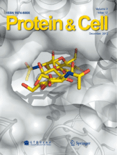
TRENDS IN BIOCHEMICAL SCIENCES
Scope & Guideline
Exploring the Frontiers of Biochemical Innovation
Introduction
Aims and Scopes
- Biochemical Mechanisms and Pathways:
The journal consistently publishes research that elucidates the fundamental biochemical mechanisms underpinning cellular processes, including metabolism, signaling pathways, and protein interactions. - Structural Biology and Protein Dynamics:
There is a strong emphasis on structural studies, including techniques like X-ray crystallography and cryo-electron microscopy, to understand protein structure-function relationships and dynamics. - Molecular and Cellular Biology:
The journal explores molecular biology at the cellular level, including gene expression regulation, RNA biology, and the implications of these processes in cellular function and disease. - Biochemical Engineering and Therapeutics:
Research exploring the engineering of biochemical pathways for therapeutic applications, including drug development and targeting disease mechanisms, is a core focus area. - Interdisciplinary Approaches:
The journal promotes interdisciplinary research that combines biochemistry with fields like bioinformatics, systems biology, and computational biology to address complex biological questions.
Trending and Emerging
- Immunometabolism and Disease:
Recent publications indicate a growing interest in the intersection of immunology and metabolism, particularly in understanding how metabolic pathways influence immune responses in diseases such as cancer and autoimmune disorders. - RNA Biology and Epitranscriptomics:
There is an increasing focus on RNA biology, including the roles of non-coding RNAs and RNA modifications, in gene regulation and cellular function, highlighting the complexity of gene expression regulation. - Biochemical Engineering and Therapeutic Applications:
Emerging themes in the engineering of biochemical pathways for therapeutic development are gaining traction, particularly in the context of gene therapy and synthetic biology. - Biomolecular Condensates and Phase Separation:
Research on biomolecular condensates and the role of phase separation in cellular organization and function has surged, reflecting a broader interest in understanding cellular compartmentalization. - Machine Learning and Computational Approaches in Biochemistry:
The integration of machine learning and computational methods to predict biochemical interactions and analyze large datasets is becoming increasingly relevant, showcasing the journal's commitment to incorporating modern technologies into biochemical research.
Declining or Waning
- Classical Enzyme Kinetics:
Research centered on traditional enzyme kinetics appears to be declining, possibly due to the rise of more sophisticated methodologies and computational models that provide deeper insights into enzyme mechanisms. - Basic Plant Biochemistry:
Although plant biochemistry remains important, the journal has seen a reduction in publications focused solely on basic biochemical processes in plants, suggesting a shift towards more applied research in agricultural biotechnology. - Single-Molecule Techniques:
While single-molecule techniques have been revolutionary, the number of publications focusing exclusively on these methods has tapered off, possibly due to the maturation of the field and the integration of these techniques into broader biochemical studies. - Historical Perspectives in Biochemistry:
There seems to be a waning interest in historical reviews and perspectives in biochemistry, as the journal increasingly prioritizes cutting-edge research and innovative methodologies. - Traditional Biochemical Assays:
The reliance on traditional biochemical assays, such as colorimetric assays, appears to be decreasing in favor of high-throughput and more sophisticated analytical techniques.
Similar Journals

Cold Spring Harbor Perspectives in Biology
Synthesis of Ideas, Pioneering Biological ResearchCold Spring Harbor Perspectives in Biology is a prestigious academic journal published by COLD SPRING HARBOR LAB PRESS that serves as a vital resource in the fields of Biochemistry, Genetics, and Molecular Biology. With an impressive impact factor and categorized in the Q1 quartile for its contributions, this journal is renowned for curating comprehensive reviews that synthesize the latest advancements and ongoing research in these dynamic and interconnected disciplines. Since its inception in 2009, the journal has played a pivotal role in advancing scientific knowledge through high-quality articles that cater to researchers, professionals, and students alike. Although it operates on a traditional subscription model, its contributions are indispensable for those seeking to remain at the forefront of biological research and its myriad applications. With a commendable ranking of #19 out of 221 in general biochemistry, genetics, and molecular biology on Scopus, this journal ensures that its readers have access to cutting-edge insights and a rigorous academic discourse.

IUBMB LIFE
Catalyzing Breakthroughs in Biochemical KnowledgeIUBMB LIFE is a prestigious, peer-reviewed journal published by WILEY, dedicated to advancing the fields of biochemistry, molecular biology, and cell biology. With an impressive impact factor and consistently ranked in the Q1 and Q2 categories across multiple relevant disciplines—including Biochemistry, Genetics, and Clinical Biochemistry—this journal has established itself as a leading platform for disseminating innovative research and critical reviews that propel scientific discovery. The journal spans a converged publication period from 1999 to 2024, providing comprehensive insights into the dynamic landscape of biochemical research. Researchers, professionals, and students alike are invited to explore its Open Access options, ensuring that groundbreaking studies are accessible to a global audience. As it continues to shape the future of life sciences, IUBMB LIFE remains a vital resource for those seeking to enrich their understanding and contribute to these rapidly evolving fields.

CRITICAL REVIEWS IN BIOCHEMISTRY AND MOLECULAR BIOLOGY
Fostering Innovation in Molecular AnalysisWelcome to Critical Reviews in Biochemistry and Molecular Biology, a premier academic journal published by Taylor & Francis Ltd, dedicated to advancing the fields of biochemistry and molecular biology. With an impressive impact factor and a Q1 ranking in both Biochemistry and Molecular Biology for 2023, this journal serves as a vital resource for researchers, professionals, and students eager to engage with cutting-edge reviews and analyses that synthesize the latest developments in these dynamic areas of study. Since its inception in 1972, the journal has maintained a commitment to high-quality scholarship, providing a platform for critical discussions that accelerate the discovery and understanding of biochemical processes and molecular interactions. Although not open access, its robust editorial peer-review process ensures that published articles meet the highest standards of scientific rigor, making it a trusted source for the scientific community. As we continue to converge toward 2024, we invite you to explore the extensive array of topics and findings that have shaped contemporary biochemistry and molecular biology.

Protein & Cell
Fostering Global Knowledge Exchange in Biochemical ResearchProtein & Cell, published by Oxford University Press, is a distinguished international journal focusing on cutting-edge research in the fields of biochemistry, biotechnology, cell biology, and drug discovery. This open access journal, active since 2014, is dedicated to disseminating innovative findings that advance our understanding of protein functions and cellular processes, making it an essential resource for researchers, professionals, and students alike. With an impressive 2023 impact factor reflected in its Q1 ranking across multiple categories such as Biochemistry, Drug Discovery, and Cell Biology, 'Protein & Cell' stands at the forefront of scientific research, driving collaboration and discussion in the scientific community. Researchers can access the journal freely online, fostering a global exchange of knowledge and contributing to significant advancements in medicine and biotechnology. Located in the United Kingdom, the journal strives to be a pivotal platform for impactful research that influences future studies and applications.

Journal of Biochemistry
Your essential resource for biochemical advancements.Journal of Biochemistry, published by Oxford University Press, is a prestigious academic journal that has been at the forefront of biochemical research since its inception in 1922. With an ISSN of 0021-924X and an E-ISSN of 1756-2651, this journal serves as a platform for disseminating high-quality research in the fields of biochemistry, molecular biology, and medicine, holding impressive rankings such as Q2 in Biochemistry and Medicine (miscellaneous) in 2023. As of 2024, the journal continues to explore significant topics in these areas, offering valuable insights for researchers, professionals, and students alike. The journal does not currently offer open access, but it remains a vital resource for anyone in the biochemical community seeking to stay updated on the latest discoveries and advancements. With its rich history and dedication to scientific excellence, the Journal of Biochemistry is an indispensable part of the scholarly landscape.

Biomolecules
Advancing biochemical discovery, one molecule at a time.Biomolecules is a prestigious, peer-reviewed journal published by MDPI that has been dedicated to advancing the field of biochemical research since its launch in 2011. With an impressive impact factor positioning it in Q1 for Biochemistry and Q2 for Molecular Biology as of 2023, this journal serves as a vital platform for disseminating high-quality research findings related to biological macromolecules, including proteins, nucleic acids, and carbohydrates. Operating as an Open Access journal, it ensures that vital research is accessible to all, furthering knowledge dissemination and collaboration within the scientific community. Located in Basel, Switzerland, the journal has established a significant presence in major academic databases, holding commendable Scopus rankings in both Biochemistry and Molecular Biology. Researchers, professionals, and students will find Biomolecules an invaluable resource for cutting-edge research, reviews, and insights in the rapidly evolving domains of biochemistry and molecular biology.

Biochemistry and Biophysics Reports
Unlocking the mysteries of biochemistry and biophysics.Biochemistry and Biophysics Reports, published by Elsevier, serves as a vital platform for the dissemination of innovative research in the fields of biochemistry, biophysics, cell biology, and molecular biology. With an Open Access model initiated in 2015, this journal aims to facilitate the unimpeded sharing of knowledge, allowing researchers, professionals, and students free access to significant findings and developments. The journal has established a presence in the academic community, currently holding a Q3 ranking in Biochemistry, Q2 in Biophysics, alongside its Q3 standings in both Cell Biology and Molecular Biology categories for 2023. These metrics underscore its commitment to quality and relevance, garnering attention with Scopus ranks reflecting its emerging influence. Located in the Netherlands, Biochemistry and Biophysics Reports continues to foster dialogue and collaboration among the scientific community through high-quality research outputs, contributing to advancements in understanding the intricate biochemical processes and biophysical principles that underpin life sciences.

JOURNAL OF BIOLOGICAL CHEMISTRY
Connecting Research and Innovation in BiochemistryJOURNAL OF BIOLOGICAL CHEMISTRY, published by Elsevier, is a premier interdisciplinary journal dedicated to advancing our understanding of biochemistry, cell biology, and molecular biology. With a prestigious history dating back to 1945 and an impressive convergence of research expected to continue through 2024, this journal holds a Q1 ranking in all three of its core categories, signaling its critical influence in the respective fields, supported by a robust Scopus ranking that places it among the top echelons of internationally recognized research. Although currently not available as Open Access, the journal is essential for researchers and professionals looking to stay abreast of the latest breakthroughs and innovations in biochemical research. With a deep commitment to scientific rigor and a focus on diverse topics ranging from cellular processes to molecular mechanisms, the Journal of Biological Chemistry serves as a vital resource for the academic community, shaping the future of biological sciences.

CELLULAR AND MOLECULAR BIOLOGY
Innovating Understanding in Molecular BiologyCellular and Molecular Biology is a prominent academic journal published by C M B ASSOC, specializing in the dynamic fields of cellular and molecular biology. Established in 1977, this journal has consistently aimed to disseminate groundbreaking research that contributes to our understanding of biochemical processes, cell dynamics, and molecular mechanisms governing life. With its ISSN 0145-5680 and E-ISSN 1165-158X, the journal plays a vital role in the exchange of innovative ideas, evidenced by its coverage of research from 1977 to 2024. Although currently categorized in the Q4 quartile for major disciplines such as Biochemistry and Cell Biology, it is dedicated to fostering the development of the field by welcoming submissions that challenge the conventional understanding and lead to novel insights. Researchers and academics looking to contribute to or stay updated in the rapidly evolving landscape of molecular biology will find this journal a valuable resource for connecting with a global community of scientists.

GENERAL PHYSIOLOGY AND BIOPHYSICS
Bridging Biological Systems with Physical PrinciplesGENERAL PHYSIOLOGY AND BIOPHYSICS, published by AEPRESS SRO, is a pivotal journal in the fields of biophysics and physiology, dedicated to advancing knowledge and fostering research in these increasingly vital disciplines. Established in 1983 and set to converge in 2024, the journal provides a platform for scholarly articles that explore the intricate relationships between biological systems and physical principles. Its current category quartiles include Q3 in Biophysics and Q4 in Physiology, demonstrating a growing influence among researchers, with current Scopus ranks reflecting its commitment to quality and relevance. Despite not being an open-access publication, the journal remains a valuable resource for professionals and students aiming to stay informed on the latest discoveries and methodologies. By supporting interdisciplinary research and innovation, GENERAL PHYSIOLOGY AND BIOPHYSICS plays a crucial role in shaping the understanding of complex biological interactions and applications in medicine.